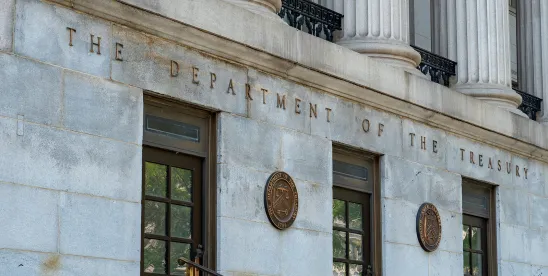On 21 June 2024, the Office of Investment Security of the US Department of the Treasury (Treasury) issued proposed regulations to implement President Biden’s August 2023 Executive Order on Addressing United States Investments in Certain National Security Technologies and Products in Countries of Concern (the EO) and certain proposals outlined in last year’s advanced notice of proposed rulemaking (ANPRM).
The EO instructed Treasury to develop and implement a new and targeted set of national security controls on overseas investments (the Outbound Investment Program), including reporting requirements and prohibitions on outbound investment from the United States in certain sensitive industry sectors (such as advanced semiconductors, quantum computing, and artificial intelligence (AI)) in the People’s Republic of China (PRC) and the Special Administrative Regions of Hong Kong and Macau (collectively, China). Key details of the EO and ANPRM are provided in our prior alert.
The proposed rule sets forth new regulations to implement the EO. It also responds to public comments on the ANPRM and provides detailed examples of key aspects of the proposed rule.
The proposed rule includes both a notice requirement (which applies to a broad class of potential overseas transactions) and investment prohibitions (which are more narrowly focused on investments in sensitive sectors in China). Violations of these requirements and the “anti-facilitation” provisions of the proposed rule can result in civil and criminal penalties, including civil penalties at a baseline of US$250,000 or twice the value of the investment (whichever is greater) and criminal penalties of US$1 million and up to 20 years imprisonment. Treasury also has authority to order divestment of investments determined to breach the applicable prohibition.
Companies and investors considering investments in advanced technology sectors—particularly in China—should review the proposed rule and determine whether changes to their investment and business plans may be warranted. Interested parties should also consider commenting on the proposed rule. Public comments are due by 4 August 2024.
Please reach out to the authors or your regular firm contacts should you have questions about the proposed rule and its implications for your business.
PROHIBITED AND NOTIFIABLE TRANSACTIONS UNDER THE PROPOSED RULE
The proposed rule’s Outbound Investment Program closely follows what was previewed by the ANPRM. Specifically, the proposed rule will require US persons to notify Treasury of certain transactions (defined as “notifiable transactions”) and will prohibit US persons from engaging in other specified transactions (defined as “prohibited transactions”) involving covered technology sectors in China or with certain Chinese owned or controlled enterprises.
The EO identified the three sectors of covered national security technologies and products within the scope of the Outbound Investment Program to include: 1) semiconductors and microelectronics; 2) quantum information technologies; and 3) certain AI systems.
The notifiable transactions and prohibited transactions are defined with respect to “covered activities” in each of the identified sectors, as set out below:
- Semiconductors and microelectronics:
- Investments in electronic design automation software; certain fabrication and advanced packaging tools; the design, fabrication, or packaging of certain advanced integrated circuits; and supercomputers will be prohibited.
- Investments related to the design, fabrication, or packaging of integrated circuits not otherwise covered by the prohibited transaction definition will trigger the notice requirement.
- Quantum information technologies:
- Investments related to the development of quantum computers and production of critical components; the development or production of certain quantum sensing platforms; and the development or production of quantum networking and quantum communication systems will be prohibited.
- Certain AI systems:
- Investments related to the development of any AI system designed to be exclusively used for, or intended to be used for, certain end uses will be prohibited. Treasury is also seeking public comment on proposals to prohibit investments in AI applications that use a specified quantity of computing power or that are trained using primarily biological sequence data.
- Investments related to the development of any AI system not otherwise constituting prohibited transactions must be notified where such AI system is designed or intended to be used for certain end uses or is trained using a specified quantity of computing power.
Transactions subject to the notification requirement must be reported to Treasury no later than 30 calendar days following completion of the relevant transaction, or within 30 days after the US person obtains knowledge of a previous transaction that met the notification requirement.
PERSONS AND ENTITIES SUBJECT TO THE PROPOSED RULE
The proposed rule adopts the same definition of US person, as defined under the International Emergency Economic Powers Act (IEEPA), that was proposed in the ANPRM. Specifically, US persons will include any United States citizen, lawful permanent resident, entity organized under the laws of the United States or any jurisdiction in the United States (including foreign branches), and any persons in the United States. US persons will be subject to the proposed regulations even while residing or operating outside the United States. As we have previously noted, the intent behind the proposed rule is not only to restrict the flow of investment capital to controlled foreign entities, but also the knowledge and know-how of US persons—including access to managerial expertise and professional networks.
Although these requirements do not extend directly to US persons’ foreign affiliates, the proposed rule will require US persons to take all reasonable steps to prohibit and prevent any controlled foreign entity from engaging in a transaction that would be prohibited if engaged in by a US person directly. US persons would also be required to submit notifications of any controlled foreign entity transaction that would be notifiable if a US person engaged in it directly. The concept of controlled foreign entities encompasses entities that a US person holds a significant interest in, including any entity in which a US person directly or indirectly holds more than 50 percent outstanding voting interest or voting power of the board of the entity, as well as entities in which the US person is a general partner, managing member, or equivalent, or an investment adviser if the entity is a pooled investment fund. The controlled foreign entity provision significantly expands the impact of the Outbound Investment Program to entities operating outside the United States.
US persons will be responsible for determining whether a transaction is covered by the Outbound Investment Program and subject to prohibition or a notification requirement, as well as ensuring compliance by their controlled foreign entities. The proposed rule sets forth a standard for knowledge with respect to the facts and circumstances of the transaction that is intended to align with the diligence process that an investor may engage in, but is likely to require most investors to significantly revise their approach to better understand related parties and downstream effects of any investment in technologies covered by the proposed rule when these may coincide with a person from a country of concern.
US persons will also be prohibited from knowingly directing an investment transaction that would be prohibited if undertaken by a US person. Similar to the concept of “facilitation” under US sanctions laws, this prohibition will require US persons to ensure that they do not knowingly enable foreign entities that they direct or manage to engage in prohibited transactions.
Unlike the declaration and notice requirements of the existing Committee on Foreign Investment in the United States (CFIUS) regulations that function as an assessment and review regime, the proposed regulations do not seek to establish a mandatory or voluntary review process. As such, US persons will have the obligation to assess their compliance with the regulations and whether investments trigger notifications or are outright prohibited. Prohibitions and notifications will be conclusive and not subject to case-by-case review by Treasury, although notifications may result in follow-up inquiries from Treasury to assess if the notified transaction is subject to prohibition. However, investors who wish to have their investments formally exempted from the proposed rule’s requirements can seek a “national interest exemption” in certain limited circumstances. Treasury expects to promulgate further procedures for applying for a national interest exemption in conjunction with an interim final rule or final rule to be issued in the coming months.
TYPES OF COVERED TRANSACTIONS
Covered transactions will include a US person’s direct or indirect:
- Acquisition of an equity interest or contingent equity interest in a covered foreign person (defined below);
- Provision of debt financing convertible to an equity interest in a covered foreign person or provision of debt financing with certain lender governance rights;
- Conversion of a contingent equity interest or convertible debt in a covered foreign person;
- Greenfield investment or certain other corporate expansions that either will establish a covered foreign person, or will cause an existing person of a country of concern to pivot into a new covered activity;
- Entrance into a joint venture, wherever located, with a person of a country of concern where the joint venture will undertake a covered activity; and
- Investment as a limited partner or equivalent into a non-US person pooled investment fund that invests in a covered foreign person.
Covered foreign persons include any persons of “countries of concern” (i.e., China including Hong Kong and Macau) (1) engaged in a covered activity, (2) having specified relationships (e.g., voting interest or board seat) with, and having more than 50% of its revenue or similar financial metrics attributable to persons of countries of concern that are themselves engaged in a covered activity, or (3) participating in a joint venture with a US person if the joint venture is engaged in a covered activity.
“Covered foreign persons” include individuals who are citizens or permanent residents of China (wherever located), entities with a principal place of business in, headquartered in, incorporated in, or organized under the laws of a country of China, the Chinese government and any persons acting on its behalf or under its control or direction; and entities, wherever located, in which one or more of the aforementioned persons (individually or in the aggregate) hold at least 50% of the outstanding voting interest, voting power of the board, or equity interest, directly or indirectly.
Note that any transaction triggering a notification requirement within any of the covered national security technologies and products sectors will be prohibited altogether if it involves a covered foreign person designated on specified US government restricted party lists, such as the Entity List maintained by the Bureau of Industry and Security of the US Department of Commerce.
EXCEPTIONS AND EXEMPTIONS TO COVERED TRANSACTIONS
The proposed rule sets out both exceptions and exemptions for otherwise covered transactions.
Excepted transactions will include the following:
- Investments by US persons in publicly traded securities;
- Investments by US persons in a security issued by an investment company, such as an index fund, mutual fund, or exchange traded fund;
- Investments of specified sizes by US person limited partners in a pooled investment fund;
- Certain intracompany transactions between US person parents and subsidiaries;
- Fulfillment of a binding capital commitment entered into prior to the date of the EO; and
- Certain voting interests obtained through loan default.
A “national interest exemption” based on impacts to national security, such as impact to critical supply chains, may also be issued by Treasury in consultation with other relevant agencies.
EFFECTIVE DATE FOR THE NOTIFICATION AND PROHIBITION REQUIREMENTS
The proposed rule is only the next step in Treasury’s rulemaking proceeding establishing the Outbound Investment Program. Comments on the proposed rule must be submitted to Treasury by 4 August 2024, after which Treasury will review and consider comments before implementing any final rules. It is possible that Treasury could issue an interim final rule or final rule as the next step in the process, but at this time we consider it unlikely that a final rule will be issued and become effective before the November 2024 elections.






 />i
/>i
